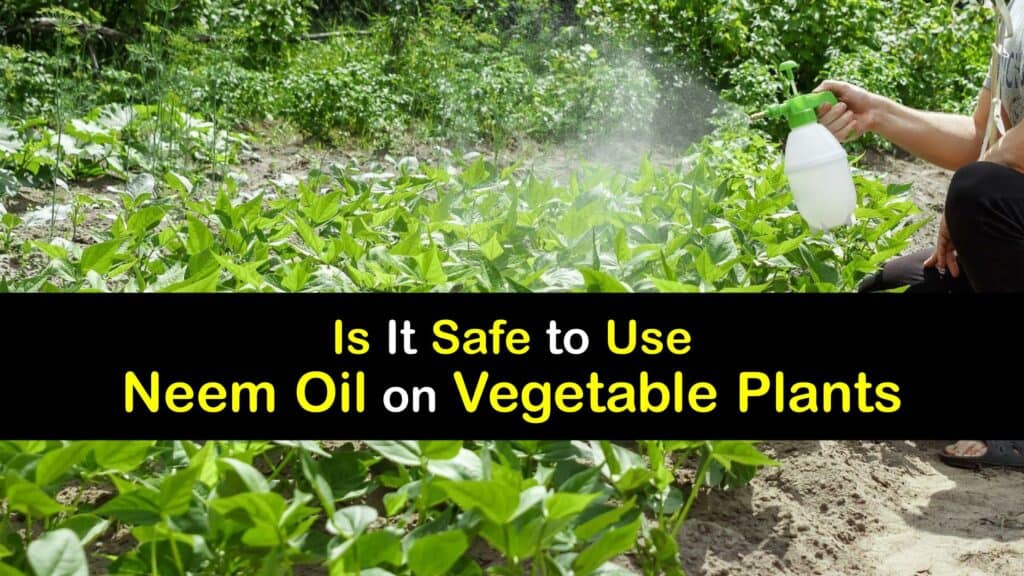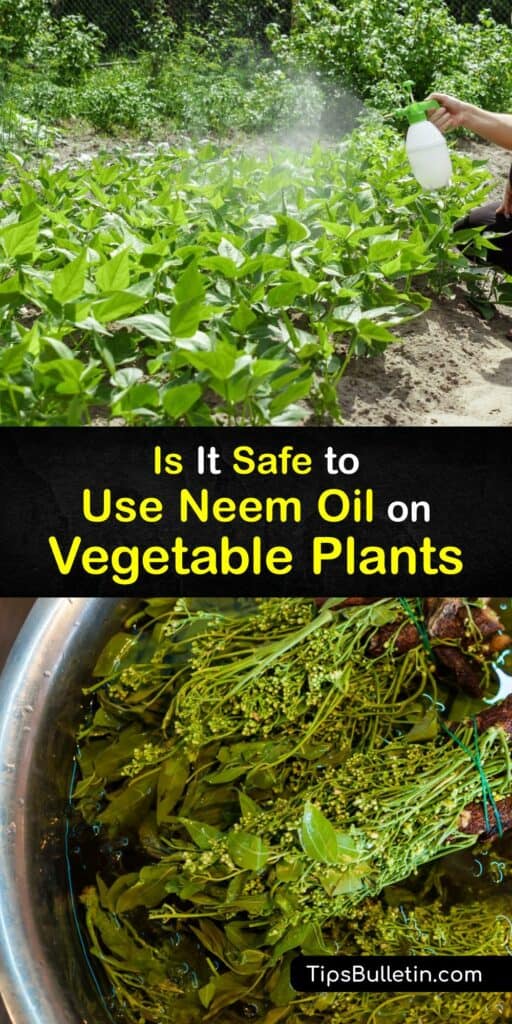While researching new vegetable plants, you may come across a product called Neem oil. If you’ve never heard of this horticultural oil, you may be hesitant to use it on your plants. Is Neem oil safe for vegetables, and how is it beneficial? This oil is well-known among those who enjoy organic gardening; learn where it comes from and how to use it to grow healthy plants.
Your new plant has much to contend with as it grows throughout the season, from fungal diseases to harmful insects. While your local garden center carries a vast selection of insecticides and plant treatments, many of them contain ingredients we’d rather not put on our veggies.
Fortunately, nature provides natural resources for soil enrichment, pollination, disease prevention, and pest control. One of these resources is the Neem tree, an evergreen tree native to India. Learn more about Neem oil benefits and uses for the garden and growing healthy vegetable plants.

Neem Oil and How to Use It in the Garden
It’s essential to use some form of insect control when gardening to promote healthy development. Knowing how to treat mildew on plants with Neem oil and keep your veggies safe from pest destruction while allowing beneficial insects to do their job is essential.
Is Neem oil safe for an edible plant? Fortunately, this natural oil is safe for ornamental and vegetable plants. Discover the benefits of using this oil as a natural insecticide or pesticide on your veggies and how to wash Neem oil off vegetables after harvesting them at the end of the growing season.

Is Neem Oil Safe for Vegetables?
Neem oil extract is a plant-based insecticide, and it is perfectly safe to use on decorative and fruiting plants, including vegetables. Learn what Neem oil is, its many benefits, and how it works to repel an insect pest from plants.
For centuries, extracts from the Neem tree (Azadirachta indica) were popular for medicinal and insecticidal purposes, from cleaning teeth to killing aphids and other pests. All tree parts contain antibacterial agents, and the plant leaves are useful for tinctures to treat skin injuries and make analgesic tea.
In addition, the bark was common for fighting cavities, and the Neem oil is a soil amendment and insect deterrent. According to the Environmental Protection Agency, Neem seed oil is non-toxic, biodegrades quickly, and contains the active ingredient azadirachtin.
This ingredient consists of compounds called limonoids, and when the insects eat it, it affects their normal reproduction and growth. As a result, it’s one of the favorite natural remedies for getting rid of Japanese beetles, caterpillars, mites, beetles, larvae, and a range of other pests.
How to Use Neem Oil on Vegetable Plants
Many insects enjoy eating veggies just as much as we do, from spider mites and aphids to the Japanese beetle. Learn how to use Neem oil on vegetable plants to keep common pests from ruining all your hard work.
Fill a garden sprayer or bottle with a gallon of cold water. Stir one tablespoon of concentrated Neem oil or clarified hydrophobic Neem oil with a teaspoon of liquid dish soap in a container and mix it with warm water. The soap is vital for emulsifying Neem oil.
Pour the warm solution into the sprayer and shake it well to mix. To make the Neem spray stronger, consider adding several drops of peppermint or lemon essential oils.
Apply the foliar spray right after the sun goes down when insects are most active, and the Neem oil spray has a chance to dry overnight. Saturate the foliage weekly or every other week for optimal results.
Additionally, it’s helpful to know when to spray Neem oil on vegetable plants. Follow the best time to spray Neem oil on citrus trees and vegetable plants. Avoid using foliar sprays if the plants are drought-stressed, and do not spray the day before you harvest them.
Another way to take care of your garden is to make a Neem oil soil drench for vegetables and plants. First, emulsify the organic Neem oil with liquid soap. Add it to a gallon of water and saturate the soil around your plant every two weeks to eliminate bugs, powdery mildew, and other fungal diseases.
How to Wash Neem Oil Off Vegetables
While Neem oil is not toxic to pets and humans, it’s always good to wash your veggies after harvesting them from the garden. Explore how to wash neem oil off vegetables to remove residue.
Before cleaning your vegetables, wash your hands thoroughly with warm soapy water. To clean veggies with firm skin, hold them beneath running water and gently scrub the surface with a soft brush. If you have leaf greens, submerge them in a bowl of cool water, swish them around, and rinse them under running water.
To give your veggies an extra clean, consider using vinegar. Pour a cup of white vinegar into a bowl of cool water and soak the vegetables in the liquid for 15 minutes. Drain the water, give them a final rinse, and dry them with paper towels.
Baking soda is an excellent veggie-cleaning alternative if you don’t have vinegar. Fill a container with two cups of cold water and add a teaspoon of baking soda. Submerge the vegetable in the liquid for about 15 minutes, swish it with your hand, and rinse it under running water.
While store-bought insecticides are helpful for quickly killing a range of pests, many of them cover the plants with chemicals that kill beneficial insects while tainting the crop. Fortunately, a Neem oil solution is a natural pesticide alternative and safe for all edible plants.

Is Neem oil safe for vegetables is a common question among new gardeners, so why not share our Neem oil veggie treatment guide with your family and friends on Pinterest and Facebook?